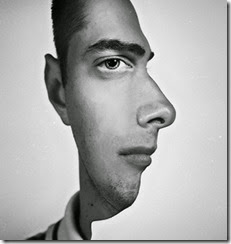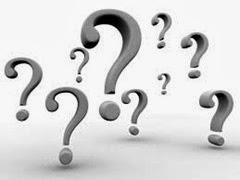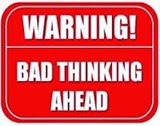Poetry is the art of saying two (or more) things at once and making them one. – Richard Wakefield, 'Poets display writing translucent and opaque', Seattle Times, 10 April 2005
In the opening chapter to his book Seven Types of AmbiguityWilliam Empson states:
An ambiguity, in ordinary speech, means something very pronounced, and as a rule witty or deceitful. I propose to use the word in an extended sense, and shall think relevant to my subject any verbal nuance, however slight, which gives room for alternative reactions to the same piece of language.
Simply put then: Ambiguity is the quality of having more than one meaning. That seems clear enough, pun intended. What I think would surprise most of us is just how ambiguous most of what we say actually is, even when we think we’re being crystal clear in our meaning. We assume because our intent is to ‘tell the truth’ (an expression which is often confused with ‘report the facts’) we’re being transparent and open when what we’re forgetting is that everything we say is open to interpretation and much is lost in the translation.
In his book Empson then goes on to discuss the (seemingly) simple sentence, ‘The brown cat sat on the red mat,’ and what becomes apparent very quickly is how unclear that sentence actually is. He continues:
The fundamental situation, whether it deserves to be called ambiguous or not, is that a word or a grammatical structure is effective in several ways at once.
Any word. Any grammatical structure.
Lawyers go to great pains to leave nothing open to interpretation. There’s a formality to their style of writing which is peppered with specialised words and phrases, archaic vocabulary (herein, hereto, hereby, heretofore, herewith etc.), Latin expressions (habeas corpus, prima facie, inter alia etc.) and quotidian words which have different meanings in law like party which indicates a principal in a lawsuit as opposed to a convivial get-together, an oblique way to refer to drug taking or a euphemism for sexual congress. It can get confusing especially when the party of the first part parties at a party with certain parts of the party of the second part. But if you’ve ever spent even a few minutes reading a legal document you’ll realize just how unclear and open to interpretation these documents often are. There’s a lot of money to be made translating legalese into plain English.
There’s no money to be made in poetry whether in translation or not and yet many poets go out their way—or so it seems—to be as opaque as possible in their writing:
Opaque poems are written with such a sense of mystery, free association of thought, or private myth-making and symbolism that sometimes even the most astute readers have difficulty "taking in" the poem rationally. The beauty of these poems, or poetic lines, lies in the realm of the imaginative, the intuitive, the metaphysical. Stream of consciousness poems are in this category. Sometimes poems or poetic lines are best appreciated for the stream of ideas and the sound combinations rather than for the reader to come away with a logical, coherent, rational meaning. Carried to extremes, the reader may leave the poem feeling isolated from the poem's "meaning" and intent. – The Poem as Craft: Poetic Elements
Communication’s hard enough when people are trying to be understood. Why go out of our way to make our readers’ lives difficult?
 In the fourth of his excellent, if a little long-winded, Norton lecturesLeonard Bernstein gives another broader definition of ‘ambiguity’ and I think it’s important to distinguish between the two kinds of ambiguity he talks about:
In the fourth of his excellent, if a little long-winded, Norton lecturesLeonard Bernstein gives another broader definition of ‘ambiguity’ and I think it’s important to distinguish between the two kinds of ambiguity he talks about:
“Ambiguity” is in itself an ambiguous word—that is it has more than one meaning. And I think before we go one step further into our enquiry we would do well to have a solid dictionary definition or two. Or two: That’s the problem. There are two distinct definitions arising from the dual meaning of the prefix ambi- which can signify “bothness” (that is being on two sides at once) and also signify “aroundness” (or being on all sides at once). The first connotation, bothness, yields such words as “ambidextrous” and “ambivalent”, which imply duality. Whereas the second connotation, aroundness, conditions such words as “ambience”, “ambit”, and so on, which relate to the general surround thus implying vagueness. Webster gives these two definitions of “ambiguous”: (1) “doubtful or uncertain” and (2) “capable of being understood in two or more possible senses”. – Leonard Bernstein, ‘The Delights & Dangers of Ambiguity’, The Unanswered Question: Six Talks at Harvard, pp.193,194
To my understanding all words naturally contain multiple meanings; they do not naturally have to be vague. On the other hand the seven types of ambiguity that Epson goes on to discuss in his book are:
- The first type of ambiguity is the metaphor, that is, when two things are said to be alike which have different properties. This concept is similar to that of metaphysical conceit.
- Two or more meanings are resolved into one. Empson characterizes this as using two different metaphors at once.
- Two ideas that are connected through context can be given in one word simultaneously.
- Two or more meanings that do not agree but combine to make clear a complicated state of mind in the author.
- When the author discovers his idea in the act of writing. Empson describes a simile that lies halfway between two statements made by the author.
- When a statement says nothing and the readers are forced to invent a statement of their own, most likely in conflict with that of the author.
- Two words that within context are opposites that expose a fundamental division in the author's mind.
I’m not going to discuss them all here but broadly speaking we have number 6 and all the rest. I refuse to believe that any poet sits down and deliberately writes nothing. I do believe that many poets expect too much from their readers. They don’t exactly expect them to read their minds but they do imagine that everyone thinks like they think and will make the same connections as they do and that is simply not the case. So the reader is forced to make something else of what’s before him.
Most people would regard me as a plain speaker. Especially in my poetry. I say what I have to say and get off the page. And yet a part of me is slightly offended by that presumption if I’m honest. I think my poems have a broader scope than is first apparent. Yes, most are immediately accessible and I think that’s a good thing but if you spend time with them (which so few people are willing to do—and not just with my poetry, any poetry) there’s more there. Life being the way it is I think we need to cater to people’s needs and present a surface meaning that people can get in a oner because at least they’re getting something from the poem. If I stood my ground and made them work they’d probably give up after a few lines, take nothing away from the poem and put even less effort into getting the next poem they come across. Their loss but my loss too. I have stuff to say. If I go to the bother or publishing a poem I want it to be read. I think what I have to say can make a difference to people’s lives and I’m willing to present what I have to say in such a way that what I have to say is at least partially communicated to my readers, the important bits at least.
Is there something to be gained from misdirecting our readers? You would think not.
Work in Progress
I have something important to say.
Please be patient.
I have the words right here, all the
words one could ever need to say
all the things that have to be said.
It won't be much of a problem.
It's just there are so many words.
It will take time to sort through them.
You can't just pick any old words.
when revealing important things.
Have you ever sat down and thought
about how many words there are?
And why it's always the small onesthat appear to make the most sense?
A cup of coffee while you're waiting?
Or herbal tea?
3 April 2007
A poem’s supposed to be about something, yes? At the very least it’s supposed to say something. And yet what I’m saying here is: I don’t have the words to say what I need to say. Think about all the important things you’ve said in your life. I bet most of them were said in words of one or two syllables, words a five-year-old could grasp—‘I love you’, ‘I quit’, ‘It’s a boy/girl’, ‘Don’t stop’, ‘Stop!’, ‘No, your bum doesn’t look big in that’—and yet you take those same simple words, jiggle them about a bit and you end up with a poem called ‘Work in Progress’ that’s maybe not quite as obvious as it first looks. I’m not saying it’s the most complex poem ever written but it does require something from the reader to bring it to life. Who’s the narrator? Who’s he talking to? What’s this important thing he can’t find the words to say? A lot of readers assume when you use the first person pronoun the poem’s autobiographical. Problem here is that the tense is the present so that means the ‘you’ is you. And how the hell could I offer you a coffee or a tea when we’re separated in time and space by several years and a couple of hundred or even thousand miles? It doesn’t make sense. What’s the poem about?
Well, I intended it to be about how hard it is to write a poem. When you read my poem you imagine—i.e. you pretend—I’m talking to you, you and you alone. That I have said or will say those exact words to some bloke in Cheyenne or a girl in Adelaide and a dozen other people scattered across the globe is neither here nor there. At this precise moment I’m talking to you, in the present even though I ‘said’ the words first way back in 2007. It’s still now. It will always be now. It has to be now for the poem to work. You need to imagine me standing—am I standing? maybe I’m kneeling—before you with something important to say and if it’s important then maybe it’s personal. Maybe I’m trying to tell you I love you; that’s pretty personal. Maybe I’m building up the courage to say how big your bum looks in what you’ve got on. Whatever I’m trying to get across, it’s obvious that it matters. It matters that I get it right. Any ol’ words won’t do. This is how I approach every poem I write. I spent time on these words. They may not be the fanciest of words. But they’re the right ones. Of course when I compose a poem my readers aren’t around like this apart from my wife and I never tell her when I’m writing a poem; she simply gets the thing handed to her to rubber stamp when I’m done. But what if you were here? Imagine the pressure.
Did you get all that from the poem? Or any of that? If you didn’t does that mean you didn’t get it? Does it matter if you didn’t get it? Am I a bad poet? Maybe you’re a bad reader. Maybe we’re just a bad fit. Tell you what, I won’t write you any more poems and you don’t read any more of my poems and we’ll both be happy. Or am overreacting?
You and I are not connected. Time, space, culture, life experience, age, gender possibly all create a gulf. My wife gets me. As much as any one person can get another person. She gets irritated by me and frustrated because I don’t always get her, so maybe I just think she gets me because I get me and I can’t see what’s so hard to get. Pretty straightforward guy, me. Although not the most communicative. I live in a wee world in my head and don’t let anyone in. I write poems as records. I actually don’t have a pressing need to communicate to anyone other than my future self. My poems are a diary, a codified diary, admittedly, but a diary nevertheless. The poems aren’t locks. The poems are keys. Take this poem:
Reflections
No
we are not ready
to
go skinny-dipping
in
one another's souls.
29 August 1989
That poem unlocks a whole series of memories. It’s also the key to understanding this later poem:
Skinny-dipping
(for Jeanette)
Being with you
is like
swimming in the sun
on a
warm Summer's day.
23 June 1996
Of course both poems work (IMHO) fairly well on their own. They’re not the greatest poems I’ve ever written but they mean a lot to me. I knew Jeanette when I wrote ‘Reflections’ but that poem’s not about her. It could be because at that time I wasn’t ready for our relationship to be more than it was; she was a casual friend and that was it. ‘Reflections’ is actually about someone else. Doesn’t matter who. On one level they’re the most opaque of poems, what my wife would call ‘decoder ring poems’. The need for some level of encoding is explained in this old poem:
Poems
Poems are near
naked thoughts: forwe will not take
off our clothes since
we are ashamed
of our bodies.
7 January 1979
We talk about naked truths but I don’t think we—or at least I (I can only really speak for myself)—am capable of complete honesty. I don’t have the words. As I wrote more recently:
Meaninglessness
Words drag
me down.
They are
out to
get me.
I look
them up
and there
are more
of them.
I look
those up
and there
are more
again.
Each word
is an
abyss
to fallinto
where there
are no
answers
only
questions.
11 August 2012
I don’t think any of the five poems above is a ‘difficult’ poem. I never set out to obfuscate. For starters I tend to shy away from words like ‘obfuscate’ although I do have a poem (which I will spare you) from my schooldays entitled ‘The Obfuscating Task of Writing a Poem’. I suppose what I aim for is translucency in poetry. Transparency is impossible. Let me make that last statement clearer: I don’t believe writing can be both poetic and transparent at the same time. It’s not in its nature. The following comes from a blog over at The Dish:
The preface to a recent translation of Greek Poet Kiki Dimoula‘s work addresses the issue of opacity in poetry. Dimoula seems to think that the question isn’t whether poetry should be opaque, but, rather, whether it can be poetry at all without being opaque. She offers a parable to illustrate:
Once, on the road to Alexandroupolis [in Thrace], long before I reached the city, I saw storks’ nests, high up, at the tops of a line of telegraph poles. Protruding from the poles, the bases of the nests were fluffy and shiny, like the fancy frills that decorate cradles, ready to welcome newborns. In the middle of each nest stood a stork, erect, immobile, on one leg, as if in this ascetic position, in this ciphered balance, it was protecting secrecy’s sacred hatchling. Already protected from above by the celestial cradle net. Poetry is like a nest to hide in. It is built on a pointed height so as to be inaccessible to the rapacious curiosity of anyone who wants to see too clearly what’s being hatched inside it. The most efficient way to safeguard concealment is by subtraction. Art is ever-vigilant, elliptical, balancing on one leg. When we write, we subtract.” (xv; emphasis added)
“When we write we subtract.” I think artists sometimes forget that simple fact because it’s true not merely for writers but composers and choreographers and visual artists. A poem is a starting point, not an end in itself. I’ve used the following quote commonly attributed to Paul Valéry before and it’s so well-known now that I suppose it’s veering on the clichéd but I still like it: “A poem is never finished; it is only abandoned.” (Actually this is a paraphrase of Valéry by Auden. Valéry actually said, “A poem is never finished; it's always an accident that puts a stop to it—i.e. gives it to the public.” And more fully, “A work is never completed except by some accident such as weariness, satisfaction, the need to deliver, or death: for, in relation to who or what is making it, it can only be one stage in a series of inner transformations.”)
I don’t think I abandon poems, deliberately or accidentally. I don’t like the verb; it has unpleasant connotations. If our poems are indeed our children we don’t—at least we shouldn’t—abandon them to the world but which one of us, no matter how good a parent we’ve been, sends out a child who’s prepared to face every eventuality? We do our best. There’s a lot of me in my daughter (poor thing) but somehow she makes it work and has blossomed (terrible word) despite that. She’s an interesting person.
In his book Beautiful & Pointless: A Guide to Modern Poetry David Orr tries to make a point by referencing one of Karen Volkman's sonnets, which opens:
Blank bride of the hour, occluded thought
wed to waning like a sifting scent
of future flowers, retrograde intent
The sonnet, he points out, is “metrically regular, is composed of fourteen lines, uses real words, and has a traditional rhyme scheme—but it doesn't make sense and is grammatically incoherent.” We latch onto what we can. But here’s a curious perspective. Rather than trying to understand the poem Orr advises posing a simpler question to which everyone will have his or her own answer: “Is it this interesting?” If you can say yes, then, as Orr notes, “that is enough.” It’s a point of view but not one I myself can live with. Interesting is not enough in itself. When I find someone interesting I want to get to know them. I want to spend time with them. An interesting poem is a… mind tease.
At its best, as Wallace Stevens says, poetry should "resist the intelligence / Almost successfully," meaning it shouldn't quite make sense, thereby expanding the reader's—and poet's—notion of sense a bit. I can live with that. But there’s resistance and there’s resistance. When you’re trying to give your wife or girlfriend a cuddle and she resists it might just be because she want you to persist. All good things are worth waiting for and worth fighting for after all. Just because a poem resists a little doesn’t mean it doesn’t want you to get to know it. It’ll let you in if you don’t give up. No one wants an ‘easy’ poem that gives away everything on first read. My poems respect themselves too much for that. I brought them up proper. They don’t wear see-through tops but they don’t mind showing a bit of leg.
The poem ‘Reflections’ is not about the relationship between the poet and his reader although it is about the relationship between a poet and a reader. But what if it was about me and you? It’s very important that the poem begins with a no. If there’s a no then something preceded it, an advance, a proposition, a question to which the answer is no. What might that question have been? What about: Can I understand you? The poem says no. Are you going to take no for an answer? Sometimes no means no and sometimes no means maybe. Try again. That’s a bit of my soul contained in those six lines. Taking off one’s clothes and being seen naked isn’t so hard even if your body’s not in the best of shape. But letting someone see you naked on the inside is another thing entirely. I’m not going to let strangers in without putting up some kind of resistance. If you’re worthy all will be revealed. And, of course, the revelation goes two ways because at that moment you’ll see yourself a little differently than you did before and there’s no going back:
Do Not Read this Poem
You mustn't read this.
Turn the page, please.
You don't want to see
the home truth here.
Because when you peer
in this darkness
you'll discover a
side to yourself
you didn't want to.
Just like right now.
I do hope you think
it was worth it.
13 July 1997
People continually squabble about what a poem is nowadays. I’m more interested in what a poem does frankly. Only one person has seen ‘Do Not Read this Poem’ and not read it. My onetime boss’s daughter—who was about eight at the time I think—was flicking through by big red book of poems, came to this one and said something like, “Okay then,” and turned the page without reading. I was very impressed. The poem’s not about me. The poem’s all about you. It’s my equivalent of “Do not eat from the tree in the middle of the garden.” Sometimes no mean no. It’s a deliberately dissatisfying poem. That’s its point.
People use all kinds of metaphors to describe poetry. If such a thing could exist as transparent poetry then it would be like a sheet of glass; opaque poetry is more like a brick wall we bang our heads against. Continuing the optical metaphor, translucent poetry would fall somewhere in between, allowing some light through but not enough for the reader to clearly get it. Ideally, though, poetry should be opaque enough to reflect some aspect of yourself like a mirror. Let me leave you with this to reflect on:
Mirror, Mirror
Before we start, gentle reader
tell me what you're looking for;
it helps if I know beforehand.
(Because poems are whores;
they become what you want,
but there's always a price.)Or we could just talk if you like.
What do you want to hear?
Surely not the truth?
Oh, I see: you like mirrors.
Well that's quite all right.
I have just the thing here.
All it takes is a little imagination.
19 August 1996





